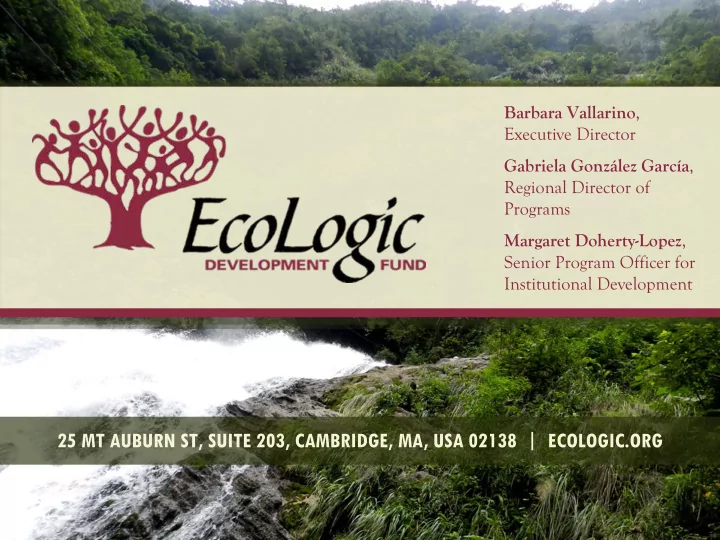

Barbara Vallarino , Executive Director Gabriela González García , Regional Director of Programs Margaret Doherty-Lopez , Senior Program Officer for Institutional Development 25 MT AUBURN ST, SUITE 203, CAMBRIDGE, MA, USA 02138 | ECOLOGIC.ORG
PRESENTATION OUTLINE 1. Our Mission and Approach 2. Mesoamerican Map of our Work 3. Tools and Techniques we Use with Communities 4. Example Local Projects 5. Scaling to the Landscape Level 6. Engaging with Mesoamerica 2020
OUR MISSION To empower rural and indigenous peoples to restore and protect tropical ecosystems in Central America and Mexico. Photos: Dan Grossman
OUR VALUES-DRIVEN APPROACH 1. SELECTIVITY: Place a premium on underserved places where untapped assets and a culture of conservation can flourish 2. SOLIDARITY: Form long-term partnerships with grassroots communities and organizations they can trust with local staff 3. CO-DESIGN: Use participatory methods and consultations to co-design and tailor projects that address human needs first, making long-term commitment to conservation and restoration possible 4. CONNECTION: Forge connections between resource users, organizations, and programs that can allow a project to be self-sustaining
SOME TOOLS & TECHNIQUES WE USE • Peer-to-peer learning and workshop facilitation • Micro-watershed management • Payment for environmental services (PES) scheme design, access to incentives programs, and encouraging adoption of forest-friendly land uses • Agroforestry, for example with inga edulis (guama) and technical assistance for soil recovery, stronger food security, and slowing slash and burn-driven deforestation • Fuel-efficient cookstoves for improved health of people and forests and early buy- in to long-term projects Photo: Dan Grossman
PROJECTS AND PARTNERSHIP SITES
GUATEMALA PROJECTS
TOTONICAPAN, GUATEMALA More than 100,000 Maya K’iche depend on a 21,000-hectare communal forest, but their traditional governance system is being threatened. Year began: 2003 Local partner: 48 Cantones Chief aims: • Sustainable management of 16,000 hectares, restoration of 5,000 hectares • Protection and restoration of watersheds • Preservation and recording of K’iche traditional knowledge and customs for new generation of leaders
HUEHUETENANGO, GUATEMALA Huehuetenango, with the highest density of native plant species in Guatemala, is home to four watersheds that provide water for more than 200,000 people. But illegal timber and firewood extraction, poor development planning, and slash and burn agriculture threaten forests and the life that depends on them. Year began: 2005 Local partner: Northern Border Municipal Alliance (MFN) Chief aims: • Collaborate with communities to manage and restore degraded areas, especially around water sources • Increase adoption of agroforestry
MEXICO PROJECTS
COJOLITA, CHIAPAS, MEXICO The Lacandon Rainforest is one of the most biodiverse regions in Mexico. EcoLogic collaborates with three Mayan ethnic groups who reside there to develop a community-based REDD+ project. Year began: 2012 Local partner: Chiapas Bureau of Environment, Natural History (SEMAHN) Chief aims: • Help communities resolve long-standing land use conflicts • Enable communities to sell carbon credits on voluntary market • Educate community members with Free, Prior, and Informed Consent (FPIC) about all aspects of a potential REDD+ project Photo: Álvaro Vallejo
LA CHINANTLA, OAXACA, MEXICO The highly biodiverse area of La Chinantla, Oaxaca, is threatened by industrial agriculture and livestock production, and conservation efforts currently suffer from a lack of unified strategies for conservation and community organization. EcoLogic is working to promote integrated community management of the Santo Domingo and Valle Nacional micro- watersheds by training and working with eight rural and indigenous communities. Year began: 2013 Local partner: Regional Environmental Collaborative for the Chinantla Region of Oaxaca, Mexico (FARCO) Chief aims: • Engage stakeholders (municipalities, Mexican government agencies, conservation NGOs) in developing a landscape-level conservation approach and PES scheme • Train & educate community members in sustainable resource management approaches (agroforestry, sustainable livestock raising, reforestation)
HONDURAS PROJECTS
NORTHERN HONDURAS LANDSCAPE EcoLogic began work with Honduran communities after 1998’s Hurricane Mitch. To-date, we’ve worked to promote a holistic approach to watershed conservation on the periphery of Pico Bonito National Park (PBNP) and in corridors connecting it to other protected areas. Moving our work to the landscape scale will require pioneering a new approach that accounts for large-scale threats from agriculture (pineapple, African palm, and other crops), timber extraction, and cattle ranching. Year began: 2003 Local Partners: Southern Sector Water Committee Association of PBNP(AJAASSPIB) and Alliance of Municipalities of Central Atlántida (MAMUCA)
NORTHERN HONDURAS LANDSCAPE Pico Bonito National Park
NORTHERN HONDURAS LANDSCAPE
NORTHERN HONDURAS LANDSCAPE Opportunities: • AJAASSPIB is award winning and influential (Equator Prize 2012, Municipality of Olanchito PES, cattle association) • Diverse matrix of protected areas and multiple use (Emerald Hummingbird, PIBOTEX) • Model Forest of Atlantida • USAID ProParque • LPFN support and advice Challenges: • Change – staff roles, partnership shifts • Skills – planning, spatial analysis, impact • Staying rooted, locally-driven but combining with full landscape view
SOME MEASURES OF SUCCESS Since 1993, EcoLogic has worked with 627 communities, achieving: • 1,260 community workshops serving 18,900 participants • 1,319,500 trees planted, many in strategic water recharge areas • 2,500 fuel-efficient stoves constructed • 840 community forest guards trained • 300 smallholder farmers implemented agroforestry • 18,510 hectares put under local community management, many as microwatersheds • 160 water committees established …and more to come, with help from you!
WHAT’s NEXT? • EcoLogic’s landscape scale-up via “Collective Impact” / “backbone support organization” approach • Interdisciplinary project teams using Open Standards for Practice of Conservation (Miradi software) • Alliances and strategic partnerships (e.g. LPFN, PARTNERS) • Continue to engage with Mesoamerica 2020 to overcome challenges to biodiversity conservation and capacity in Mesoamerica
THANK YOU! Guatemala Office: 5 a calle 14-35, Zona 3 Apartamento 202, Edificio Las Tapias, Quetzaltenango, Quetzaltenango 09001 Guatemala (+502) 7763-5682 USA Office: 25 Mt. Auburn Street, Suite 203 Cambridge, MA 02138 (617) 441-6300 www.ecologic.org
Recommend
More recommend